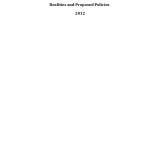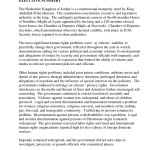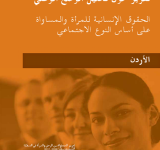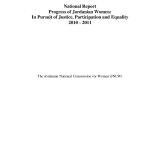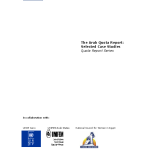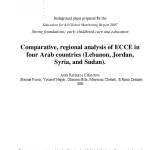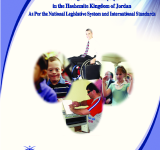political
This report was jointly prepared by the Jordanian National Commission for Women (JOHUD);; the Jordan Hashemite Fund for Human development/Regional Economic Empowerment of Women Project (REEWP) and the United Nations Population Fund (UNFPA). The report discusses the right to inheritance and debates a number of issues including the provisions concerning women's rights to inheritance in Islam;; the legal framework of the women's rights to inheritance in Jordan;; the guarantees of these rights and finally the reality of the women's right to inheritance in Jordan. The report concludes with recommendations.
يهدف التقرير إلى عرض أهم مشاكل حقوق الإنسان في الأردن;; والتي كان ابرزها: سوء المعاملة ومزاعم التعذيب من قبل مسؤولي الأمن والحكومة مع الإفلات من العقاب;; والقيود المفروضة على حرية التعبير التي تحد من قدرة المواطنين ووسائل الإعلام في انتقاد السياسات والمسؤولين الحكوميين;; وشملت أيضاً ظروف السجن السيئة والاعتقال التعسفي والحرمان من المحاكمة العادلة من خلال الاعتقال الإداري;; والاحتجاز لفترات طويلة;; ومزاعم من المحسوبية ونفوذ المصالح الخاصة على القضاء. واستمرت الحكومة في التعدي على حقوق الخصوصية للمواطنين. وكان العنف ضد المرأة منتشراً على نطاق واسع;; واستمرار الاعتداء على الأطفال. والى جانب انه لا يزال التمييز القانوني والمجتمعي والمضايقات تمثل مشكلة بالنسبة للمرأة. وكان التمييز ضد الأشخاص ذوي الإعاقة مشكلة. وظل التمييز القانوني والمجتمعي ضد الأشخاص من أصل فلسطيني واسع النطاق. وذكر التقرير أن الحكومة قيدت حقوق العمال ومنظمات حقوق الإنسان المحلية والدولية على مستويات عالية من إساءة معاملة خدم المنازل الأجانب. ولقد كانت المواضيع الرئيسية في هذا التقرير هي: الحق في العمل;; الحق في الخصوصية والحق في التعليم;; والتمييز العنصري;; والتمييز ضد المرأة;; والحق في حرية التنقل;; والحق في حرية التعبير;; والحق في حرية تكوين الجمعيات;; والحق في حرية الدين ;; والعنف;; وعمالة الأطفال;; الحق في محاكمة عادلة;; الحق في المشاركة;; الحق في الضمان الاجتماعي.
وﻳﻜﻤﻦ اﻟهدف اﻟﻌﺎم ﻣﻦ اﻟﺘﻘﺮﻳﺮ اﻟﻮﻃﻨﻲ ﻓﻲ اﻟﻘﻴﺎم ﺑﺘﺤﻠﻴﻞ وﺿﻊ ﺣﻘﻮق اﻟﻤﺮأة واﻟﻤﺴﺎواة ﻋﻠﻰ أﺳﺎس اﻟﻨﻮع ﺑﺎﻟﺘﺮﻛﻴﺰ ﻋﻠﻰ اﻹﺻﻼﺣﺎت اﻟﻘﺎﻧﻮﻧﻴﺔ واﻟﻤﺸﺎرﻛﺔ ﻓﻲ ﺻﻨﻊ اﻟﻘﺮار ﻓﻲ اﻟﻤﺠﺎﻟﻴﻦ اﻟﻌﺎم واﻟﺨﺎص واﻟﻌﻨﻒ اﻟﻤﺮﺗﻜﺐ ﻋﻠﻰ أﺳﺎس
This national report is designed to trace the progress of women in various fields;; monitoring achievements;; and highlighting gaps and failures;; as well as analyzing indicators;; recommending measures;; and measuring levels of achievements in the implementation of plans and strategies. The main themes were selected according to national priorities dictated by each stage: Legal Protection for Women's Right to Access Justice;; Participation;; the Economic Empowerment of Jordanian Women;; Equality;; Citizenship and Decision-Making in Public Life. The conclusions of this report confirm that a much smaller effort was exerted at the level of providing information;; data and the provision of services in the area of providing justice and facilitating ways of achieving it. The lack of knowledge about available services among women;; whether provided by civil society organizations or government institutions;; affects women's ability to access justice negatively. Regarding the economic participation the Policies and plans that targeted empowering women economically show that the result of these policies was weak and limited. Difficulty of women’s access to job opportunities in the private sector and inequitable pay between the sexes;; lack of supporting services to working women;; including childcare Facilities;; poor matching between education outputs and skills required in the labor market and the traditional social standards that contribute to directing females towards certain professions. The report proposed general recommendations and directions that include quick solutions to deal with the main highlighted challenges.
This report was compiled from the findings and case studies presented at a workshop held on 5-6 December 2004;; in Cairo Egypt. This report contains an overview on global trends and regional analyses;; implementing legislated quotas for women;; quota adopted by political parties;; methods on enhance women’s participation;; and the role of the international community and international instruments. The international IDEA had convened a series of regional workshops to gather qualitative data. The report also has 6 case studies about women’s participation and quota include comparative experiences with quotas;; address the culture challenges to women’s representation in the Arab world;; and point the opportunities that could be seized in order to meet those challenges.
This report provides an overview of the status of early childhood care and education (ECCE) in Jordan;; Lebanon;; Sudan;; and Syria. It examines the contextual factors influencing ECCE;; highlighting current policies;; challenges;; and strategies for improvement and expansion. The report underscores the paucity and limitations of available data. Findings show that ECCE services have improved but regional disparity and dominance of the private sector prevail. None of the four countries but Jordan has a full-fledged national strategy and policy on ECCE. Challenges identified include lack of qualified teachers;; societal misconceptions about the unique features of early childhood;; and lack of research-based studies. Innovative projects show that NGOs have been instrumental in addressing the needs of marginalized children.
This study aims to demonstrate the rights of disabled people stated by the legislator. The study shows the extent to which state and civil society institutions adhere to the implementation of applicable legislations related to people with disabilities.

